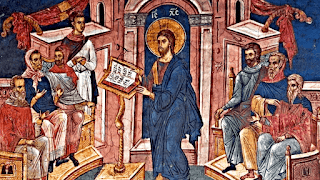The Spirit of the Lord is upon
me,
because he has anointed me
to bring glad tidings to the poor.
He has sent me to proclaim liberty to captives
and recovery of sight to the blind,
to let the oppressed go free,
and to proclaim a year acceptable to the Lord.
My dear brothers and sisters,
These words that we heard in the Gospel today would be familiar to many of us. To some of us, these words would have a special meaning, having provided the raison d’etre of our lives. Nevertheless, when I read these words today, I was struck by the last line “and to proclaim a year acceptable to the Lord,” because ever since the 29th of December, we have been in a Jubilee year, which is Our Lord referred to in the portion of the Gospel we just heard.
The foundations of the Jubilee year were laid when, through Moses, God gave the law to Israel. Thus, in chapter 25 of the book of Leviticus we read:
You shall hallow the fiftieth year and you shall proclaim liberty throughout the land to all its inhabitants. It shall be a jubilee for you: you shall return, every one of you, to your property and every one of you to your family (Is 25:10).
In this year of jubilee you shall return, every one of you, to your property. When you make a sale to your neighbor or buy from your neighbor, you shall not cheat one another (Is 25: 13, 14).
You shall not cheat one another, but you shall fear your God; for I am the Lord your God (Is 25: 17).
Brothers and sisters, from both, the verses read out by Our Lord, as well as in these verses from Leviticus, it is clear that a Jubilee year is about righteousness and justice. We make things right among our brothers, and God rights the relationship we have with Him. God’s mercy, freely extended in the form of an indulgence in the course of a Jubilee year, “transforms the boundaries of human justice” and “free[s] our hearts from the weight of sin because the reparation due for our sins is given freely and abundantly.”
The first reading today has something to teach us about our comportment in the course of a Jubilee Year. Ezra the priest reads out the law, forgotten by the people in the course of the Babylonian exile, and – we read – “the people were weeping as they heard the words of the law.” The people were weeping, dear brothers and sisters, because they realized that bereft of the law, they had been leading sinful lives and were filled with repentance. My dear brothers and sisters, this is the task before us in this, and any, jubilee year; return to hear the instructions of the law, and then filled with repentance for our sins, return to the law and the righteousness of God’s ways.
Beloved, living in the times that we do it is easy to forget the law, but every Mass we attend offers us reminders of aspects of it. It is also essential that in the course of this Jubilee year we begin a practice of regular confession, so that we may be reconciled both with our brethren and God.
But a Jubilee year is not only about repentance and tears, for, as Ezra reminds us:
Today is holy to the LORD your God.
Do not be sad, and do not weep
Go, eat rich foods and drink sweet drinks,
and allot portions to those who had nothing prepared;
for today is holy to our LORD.
Do not be saddened this day,
for rejoicing in the LORD must be your strength!
Indeed, the Jubilee year is a year for rejoicing, but a rejoicing that is in the Lord, by keeping in His ways, and being reconciled with him. And once again, dear brothers and sisters, remember this call to “allot portions to those who had nothing prepared.” There is no jubilee year, when there is no distributive justice, when we do not share with others less fortunate.
There is another element to the righteousness of the Jubilee year. We cannot profane the year of the jubilee with works that are unworthy. Even the simplest of acts may be those that take away from our brothers. Let me end by proffering a small example. I was in a vehicle some days ago, which was flying down some of these new expressways that now contaminate Goa. Dissatisfied with the speed at which he was already travelling, the driver chose to overtake from the left! Overtaking from the left, as you know, is a violation of traffic regulations, and you can take someone’s life in the process. Every death on Goan roads, my dear brothers – and there are too many deaths on our roads – is a manifestation of the disregard we have not only for traffic regulations, but for life itself, and because we privilege our own pleasure. Every violation of a right of others demands restitution and it would be a good idea to begin our commemoration of the jubilee year, by the restraining of ourselves when in traffic, chastising ourselves when we break traffic norms, and then confessing that sin at the earliest possible opportunity. If we only did so much, we would be making “a year acceptable to the Lord.”
May God bless you and help you keep the Jubilee year holy.
(A version of this homily was first preached to the faithful at the parish of Our Lady of the Rosary, Fatorda on 25 Jan 2025.
This homily is dedicated to my brother Joel Albert Fernandes, whose generosity has made this homily possible. Do offer a prayer for him.)


No comments:
Post a Comment